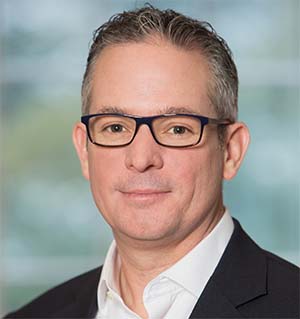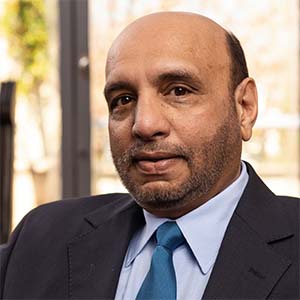IFS is one of the well-kept secrets that abound in the IT industry. It’s a smaller enterprise resource planning (ERP) vendor that gives the big players a run for their money in the market niches that it is making its own.
Kathy Gibson met up with Darren Roos, CEO of the company, and Mohamed Cassoojee, country manager and MD of IFS South Africa, to find out how they are planning to make IFS more relevant in the local market.
 Anyone who has been around the South African IT market for any length of time will remember Darren Roos as first sales manager then country manager of the local Software AG operation.
Anyone who has been around the South African IT market for any length of time will remember Darren Roos as first sales manager then country manager of the local Software AG operation.
He moved on to an international role in Software AG and was later appointed into an executive position at SAP’s European business.
Now, he’s surfaced as the CEO of little-known software vendor IFS.
“IFS was acquired by a private equity firm a couple of years ago, and they were searching for a new CEO,” he explains.
When a headhunter approached him to take on the role, he realised it was an opportunity not to be missed. “I was intrigued by the opportunity to do a job in a space I know well – and to be the boss.
“The benefit with being the CEO is that the buck stops with me; and I can run the business the way I believe it can be done.
Roos started the new job on 1 April, and has made some major changes already. “I’ve been getting to understand the business and looking at the African operation I knew there was huge potential that just needed a driving force to realise it.
“So I looked up Mohamed Cassoojee and talked to him about driving the IFS business in South Africa.”
 Cassoojee, country manager and MD of IFS South Africa, was previously the country manager of Software AG, so he’s worked with Roos before.
Cassoojee, country manager and MD of IFS South Africa, was previously the country manager of Software AG, so he’s worked with Roos before.
He was also quick to see how IFS could thrive in the local market. “I Immediately recognised the market opportunity and how under our weight IFS was punching,” Cassoojee says.
“When I met with Darren I realised this was a great opportunity for me; and for IFS as well.”
Roos adds that both he and Cassoojee come from the ERP world. “We’ve seen customers live through long, convoluted rollouts, with horror stories of five and six year rollouts.
“But we don’t live in a world where you can define the processes now and implement them five years later,” Roos says. “In IFS we have got a very credible alternative to the very big vendors.
“It’s simpler, easier, quicker to deploy and easier to use. It seemed to us that it’s a compelling proposition.”
IFS isn’t an insignificant company by any means. Globally, it turns $550-million in revenue and employs 4 000 people.
“So it’s big enough to be a big software business with global footprint,” Roos explains. “But it’s small enough that our customers have my mobile number.”
The vendor has had a presence in South Africa for some time, but its success has been spotty.
“From a South African perspective, the business has gone through some peaks and troughs,’ Cassoojee says. “So it’s not as focused as it should be in the local market – in fact, it’s probably a bit more focused on Africa than on the South African market.”
He’s excited about the potential, though. “There is an opportunity to be able to deliver, unlike typical large ERP organisations which spend a lot of time solving delivery issues.
“And peer reviews show a high level of customer satisfaction with IFS.”
IFS has had a lot of success internationally as a solution provider in the aviation and defence businesses, Roos points out.
“This vertical is something of a sweet spot, and we’ve got customers ranging in size from small to very large,” he says.
IFS is employed for asset planning, field service management, call centre, and more. “But we are probably best known for our ERP solution where we operate mainly in the mid-market space, for companies up to about R50-billion.”
Although it calls itself a mid-market player, Roos points out that IFS, with a top limit of about 15 000 users, would be relevant for just about any South African customer
In the local context, IFS is a popular choice for organisations that don’t have a legacy, Cassoojee adds. “Companies that haven’t yet don’t an ERP rollout are well suited because of the quick time to value that IFS brings.
“On the other hand, companies that have already rolled out ERP can benefit from a solution that integrates with their legacy quickly and cost-effectively.”
This is important in the current business environment, he adds. “We have moved to a services economy. Products are a commodity now, and it’s the experience that people want.
“So companies have to understand how to provide a service to their own customers.”
This is true for all organisations, Cassoojee adds: from municipalities to large engineering or construction companies.
IFS hopes to show South African companies its value proposition and significantly increase its market share.
There are currently 20 people in the local operation, but Roos says the plan is to increase this significantly.
“We have very large private equity backers so are able to invest,” he says. “The only question is what the market can sustain.”
In the past, IFS had a direct go-to-market strategy, but it plans to open this up to channel partners. “We are open for business from a partners perspective,” Roos says.
The company already has relationships with Tech Mahindra, TCS and Accenture, as well as boutique partners in vertical market solutions.
“The bottom line is that IFS is willing to invest in the market, building an ecosystem and getting new people on board,” Cassoojee says.
“We have been a hidden secret for too long.”
The time is right and the circumstances favourable, Roos adds. “The reality is that the South African market has been so dominated, there is a real desire for a sensible alternative.
“If you are going to invest time and effort to implement a solution, you want to know that the vendor is going to be around in 10 years’ time. Well, IFS has been around for 35 y ears and is going strong.
“Our value proposition is that we provide the global robustness that makes us a sensible alternative.
“The IFS software is easier to use and faster to deploy – and the market is yearning for just that.”
IFS doesn’t focus on the financial services or retail business, but focuses on asset-intensive industries. “We are strong in anything to do with manufacturing, construction, telecommunications or mining – any business that is involved with manufacturing or is product-related is a great customer.”
Cassoojee has already started planning the go-to-market strategy for South Africa. “The immediate goal is getting new sales people in the place, aligning with the market and growing on an organic basis.”
Growth will come from the software’s ability to solve customers’ problems, Roos says.
“We’re coming in here essentially as a new player, saying we have a message and a sensible ERP alternative. But the reality is that it is a pull, not a push: everyone has their own issues – we have the opportunity, as a new broom, to sweep clean and we intend to take advantage of that.
“We have 10 000 customers worldwide; we are in the leadership quadrants wherever we compete; and are the highest-ranked ERP vendor in Gartner’s peer insight.
“People are starting to realise that we are an alternative, that the status quo can be disrupted.”
